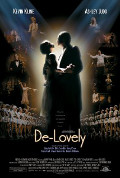
Directed by
Irwin Winkler
125 minutes
Rated M
Reviewed by
Bernard Hemingway


De-Lovely
Synopsis: An aged Cole Porter (Kevin Kline) watches with the Angel Gabriel (Jonathan Pryce) in the role of a musical stage director a re-enactment of his life.
Telling the story of an individual's life within the running time of the conventional feature film is a big ask. There's the problem of what to leave in and what to leave out, how to separate truth from fiction and balance reality with narrative requirements. When your subject is one of the great contributors to the American songbook and you want to showcase his work the task is large, to say the least.
In addressing such difficulties, historically, Hollywood's answer has been to toss out truth and reality and, as John Ford famously said, "print the legend". Such was its santized 1946 telling of the Cole Porter story, Night And Day with Cary Grant playing the songsmith and Alexis Smith as his wife.
Director Irwin Winkler and his writer, Jay Cocks, have not opted for a radical revision of Porter's life story - the glamorous lifestyle is largely preserved, a decision permitting rich production values - but it does make a 180 degree turn on the Michael Curtiz version insofar as that flm completely supressed the fact that Porter was gay. In this film he is unrepentantly, serially, promiscuous (although all we see of this is him lightly embracing handsome young men).
The wonderful music is of course the same albeit updated with some of Porter's best-known tunes de-lightfully interpreted here by the likes of Robbie Williams, Elvis Costello, Alanis Morissette, Sheryl Crow, Natalie Cole and Diana Krall. The overall structure of the film is a familiar one. It opens with Porter at the end of his life (the film could be read as a death-bed vision) then dissolves to an account of how he arrived at at that point. There are a number of cleverly-executed devices used to break up a purely factual telling, with the songs being interspersed with events in Porter's life a-chronologically, giving the film-makers a story-telling freedom that a strictly chronological narrative would have not.
Kline's performance (the actor had starred in Winkler's 2002 film, Life As A House), helped by skilful hair and make-up departments, is compelling, transforming himself into his character as few film actors can do (and certainly Cary Grant did not). As a good portion of the film is given over to the staging of the songs there is not a lot in the way of dramatic engagement other than his relationship with his wife (Ashley Judd) which was largely one of platonic convenience built on profound respect for each other. Judd is very good in this respect, never trying to grab the limelight, Other characters mill about as was the wont of the idle rich in the Roaring 20s, drifting from cocktail party to cocktail party and country house to city apartment as the seasons changed (this is most apparent in the personae of the Porters' best friends, the Murphys, who in real life were the originals for Fitzgerald's Tender is the Night). Jonathan Pryce gives a lively turn in a relatively small.
As far as musicals go De-Lovely is quite down beat, a far cry from Astaire and Rogers, but MGM, once the leading Hollywood studio for the genre, and the creative team are to be commended for their candour and for lovers of Porter's music it will be a treat.
Want something different?





